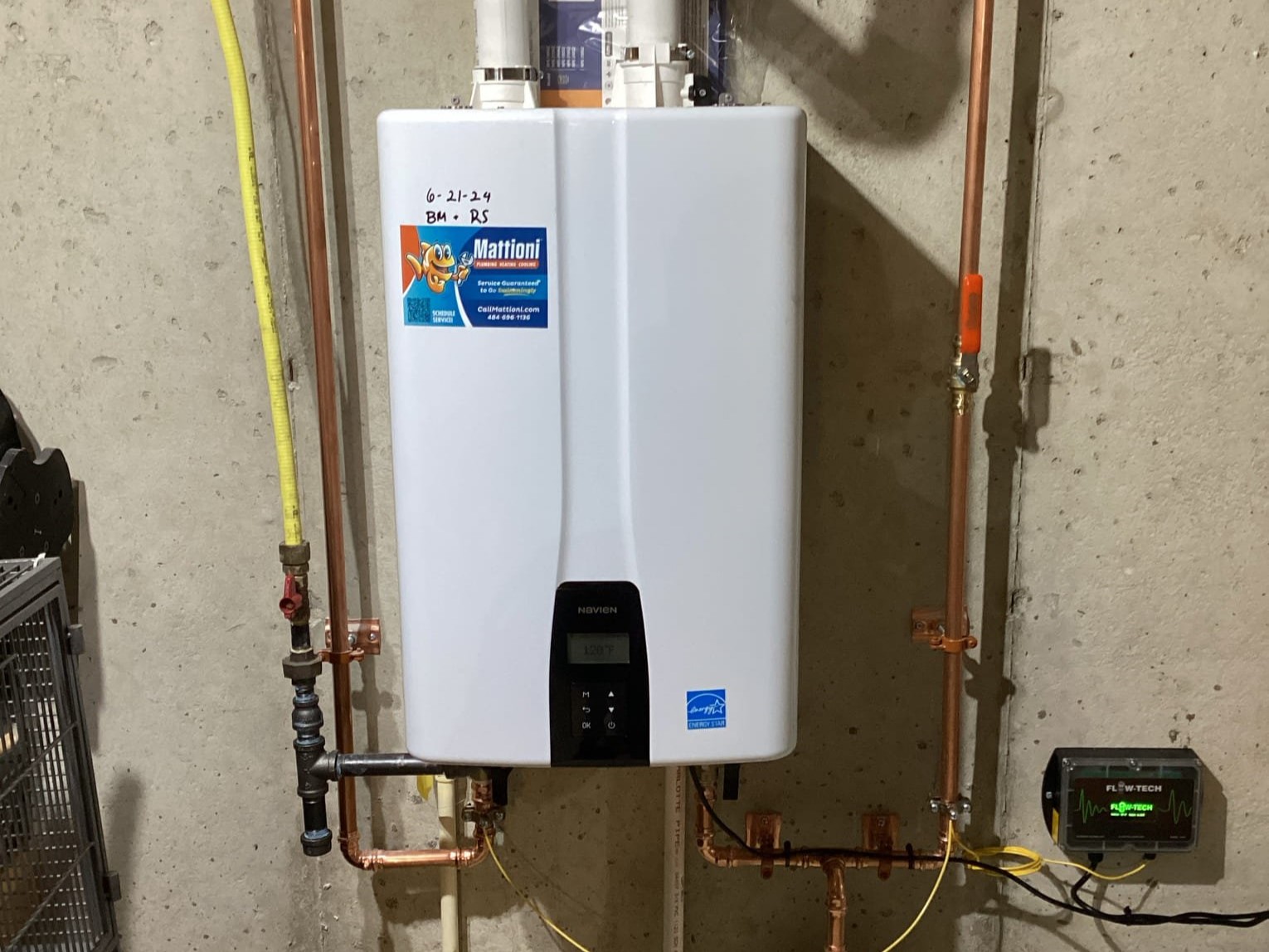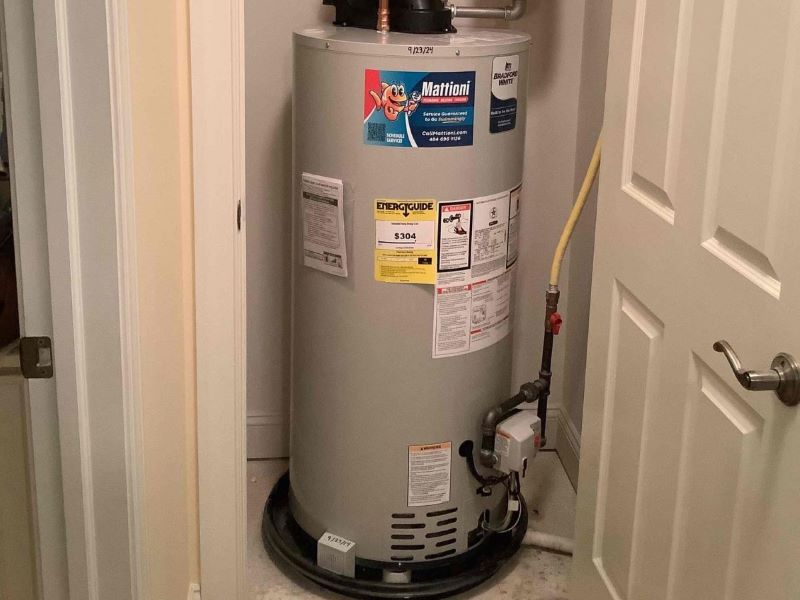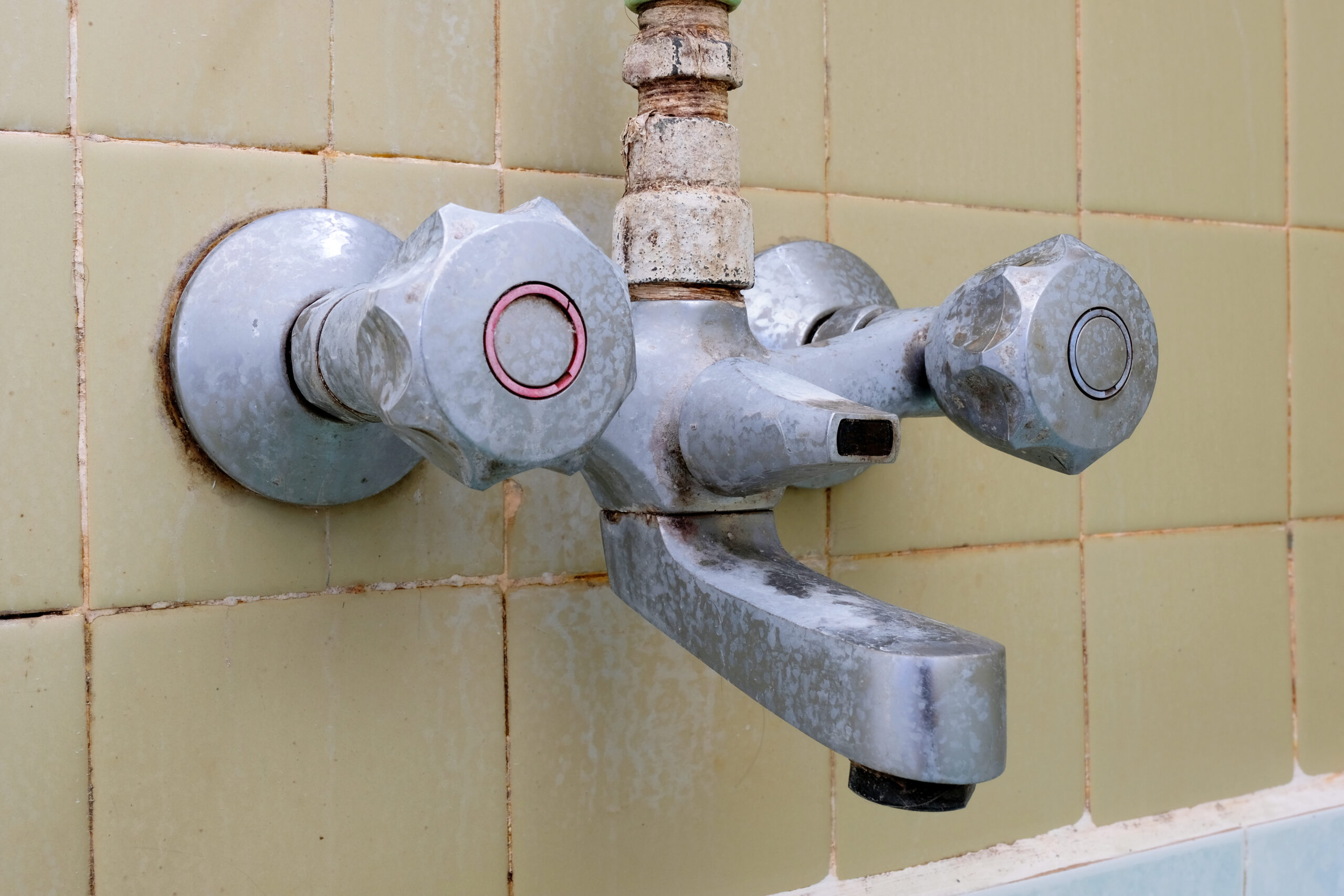|
Getting your Trinity Audio player ready...
|
Last Revised: 12/30/2024
When was the last time you thought about your water heater? Can you even remember how old it is?
If you’re like most people, it’s probably working quietly in the background, delivering hot showers and clean dishes, without giving it a second thought. But here’s the thing – your water heater won’t last forever. And when it starts to fail, it can go from being an afterthought to a major problem much faster than you’d expect.
At Mattioni, we specialize in providing reliable water heater maintenance and installation services and have been doing so for over 75 years. We’re here to help you too, as the first step to preventing disastrous water heater flooding is awareness.
In this article, we’ll dive into everything you need to know about the expected longevity of different types of water heaters, what causes them to wear out, and the simple steps you can take to keep it running. A little knowledge and preparation now can save you from a lot of stress later (spoiler alert: there’s more to worry about than flooding damage).
Before we dive into the anticipated lifespan of each type of water heater, let’s explore how they wear down in the first place.
What Causes Water Heaters to Wear Down?
Water heaters become worn out over time due to a combination of factors, with sediment buildup near the top of the list. In particular, hard water (which has a high concentration of minerals like calcium and magnesium) can take a serious toll on a water heater, potentially reducing its lifespan.
As hard water flows through the system and is heated, calcium and magnesium settle at the bottom of the tank. Over time, this becomes a layer of sediment which reduces the heater’s efficiency and can cause the tank to overheat, accelerating its deterioration.

Another major issue is corrosion of the inner tank due to prolonged contact with water for several years. Water heaters combat this effect as they are equipped with an anode rod, designed to attract corrosive elements and protect the tank’s lining. However, once this rod is depleted, the tank itself becomes susceptible to rust, cracks, and potential leaks.
Pressure-related problems can also contribute to wear and tear. High water pressure from thermal expansion places undue stress on the tank, increasing the likelihood of cracks or leaks. Neglecting to install a thermal expansion tank with your water heater can possibly lead to devastating flooding stemming from internal pressure.
Ignoring standard maintenance practices also exacerbates these issues, as failing to flush the tank or replace the anode rod allows problems to accumulate unchecked.

What’s the Expected Lifespan of Each Type of Water Heater?
There are a few types of water heaters, each with its own design, technology, and anticipated longevity. The expected lifespans of each kind shared below reflect the length of time they can be relied on without the risk of failure. Neglecting to replace your water heater could result in a small leak or a major flood, so by the end of each range it’s wise to begin the replacement process.
Here’s the breakdown of how long you can expect each style of water heater to last:
Steel Tank Water Heaters
The most popular option chosen by homeowners, steel tank water heaters can be expected to last 10-12 years. This type of water heater breaks down in two ways:
1. Consistent exposure to water that’s undergoing major temperature changes will slowly wear on the tank’s glass lining and eventually break through it. When this happens, water will contact the steel shell directly, leading to cracks and corrosion. After about 10 years, the steel shell will become susceptible to small leaks or potentially a major flood if the tank breaks through all at once.
Steel tank water heaters address this with something called an anode rod. The anode rod is placed in the center of the tank and is designed to give the water something to attack instead of the tank itself. Replacing your water heater’s anode rod every three years can add years to the system’s longevity.
2. Sediment buildup at the bottom of the tank will damage the efficiency of the system and expedite wear and tear of both the outer glass lining and inner steel shell. Flushing your tank once every three years can help to reduce this effect and maintain the system’s health and efficiency.
Plastic Tank Water Heaters
Swapping steel for plastic for the inner shell of a tank-type water heater adds up to a decade to the system’s expected lifespan, making it one of the smarter long-term household investments. Plastic tank water heaters should last 20 years before you’ll need to start thinking about replacing them, and some even come with a lifetime system warranty.
Plastic tank water heaters are situated in a similar fashion to steel ones, but their material (polyethylene or polypropylene) is much more resistant to weathering, cracks, corrosion, and abrasions. They still have a glass lining and anode rod (which should still be replaced every three years), however plastic tanks have a much greater resistance to the fatigue that causes steel tanks to crack and leak.

Tankless Water Heaters
Tankless water heaters are gaining popularity for their highly efficient on-demand hot water supply, but their longer life expectancy shouldn’t be overlooked. They last about 15-18 years before needing to be replaced, putting their longevity potentially in the same ballpark as that of a plastic tank.
It’s important to know that while their efficiency is close to the top of all water heaters, the performance of tankless water heaters can drop off significantly if maintenance is neglected, leading to a shorter operational life. In particular, sediment buildup from hard water takes a greater toll on this type of system than a tank type, so flushing the system annually is crucial in maintaining efficiency and system health.
Some tankless water heater manufacturers offer a 15-year heat exchanger warranty, giving you a clear picture of how long they’re expected to last.
Heat Pump Water Heaters
Heat pump water heaters are the cream of the crop when it comes to efficiency, offering potentially significant reductions in your energy bills. Although their inner tank shell is made of steel, they have a slightly longer expected lifespan of 12-15 years due to the diminished wear and tear that comes with higher efficiency levels.
Rather than heating using a burner, heat pump water heaters use the thermal transfer properties of refrigerant – the same technology that makes AC and refrigeration possible. This allows the entire tank to experience wear and team uniformly, rather than the portion near the burner to wear out first.
Heat pump water heaters still rely on regular maintenance and flushings to achieve this optimal lifespan.
A Quick Recap on Water Heater Lifespans
While efficiency and affordability are two major components of your water heater replacement process, don’t neglect the expected lifespan of the equipment. Here’s a quick recap of each type’s anticipated operational lifespan with proper maintenance:
- Steel Tank Water Heaters: 10-12 years
- Plastic Tank Water Heaters: 20 years
- Tankless Water Heaters: 15-18 years
- Heat Pump Water Heaters: 12-15 years

Risks of Not Replacing Your Water Heater Proactively
Delaying the replacement of a water heater that’s approaching or has surpassed its average lifespan can lead to significant risks and costly consequences. The most pressing concern is the potential for sudden failure. As they near the end of their operational life, water heaters are more likely to fail catastrophically, resulting in the worst-case scenario of flooding and extensive water damage.
Beyond structural issues, older water heaters also become less efficient, which means higher energy bills and slower water heating. You could also potentially encounter rust or discoloration in your water, a sign of internal corrosion.
Leaks are another common issue with older units. While small leaks may seem harmless at first, they can quickly worsen if left unaddressed, leading to flooding and water damage. In rare cases, if you haven’t maintained your thermal expansion tank, water heaters can become depressurized quickly, posing serious safety risks.
Being proactive about replacing your water heater can prevent these problems, ensuring an efficient and steady supply of hot water while protecting your home from avoidable damage.

Steps to Prolong the Life of Your Water Heater
With proper care and attention, you can extend the lifespan of your water heater and maintain its efficiency. Here is a step-by-step guide:
1. Flush the Tank (or Tankless System) Annually
Sediment buildup is a primary cause of wear and tear in both tank-type and tankless water heaters. Flushing the tank annually helps remove these deposits, keeping the heating elements free of blockage and reducing the strain on the system.
2. Inspect and Replace the Anode Rod Every Three Years
The anode rod is tasked with providing the water inside the tank with a surface to attack instead of the tank itself. When this component expires, the tank will become much more susceptible to corrosion. Check the anode rod every three years and replace it once it’s heavily corroded. Don’t hesitate to call a professional plumber for assistance with this crucial step – it can significantly delay tank corrosion.
3. Install a Water Softener
If your home has hard water, installing a water softener can minimize the mineral deposits that hinder efficiency and lead to premature failure. Removing minerals like calcium and magnesium from your water supply will boost efficiency and keep the system healthier for longer.
4. Check the Pressure Release Valve
Periodically test the pressure relief valve to ensure it’s functioning correctly. This valve prevents dangerous pressure buildup in the tank that can cause unseen damage. Be sure to follow safety precautions when opening the drain valve.
5. Insulate the Tank and Pipes
Adding insulation to the tank and any exposed hot water pipes can reduce heat loss, thereby improving energy efficiency and reducing the workload on the water heater.
6. Schedule Professional Maintenance Appointments Regularly
Hiring a professional plumber for an annual inspection is among the most cost-effective strategies to maximize the lifespan of your water heater. A plumber can identify potential issues early on and ensure the unit operates efficiently. A VIP membership can reduce the cost of professional guidance.
Proactive vs. Reactive Water Heater Maintenance & Replacement
Let’s face it – most of us don’t give much thought to our water heaters until something goes wrong. It’s a trusty appliance that quietly works behind the scenes to deliver hot showers, clean dishes, and warm laundry without a second thought. But the moment it fails? Chaos and, potentially, catastrophe ensue.
A reactive approach to replacing your water heater can lead to more than just a few cold showers – it can cause a leak that destroys your flooring and belongings. Not just that; a complete breakdown might mean you’re faced with an expensive replacement at an unplanned time. But it doesn’t have to be that way.
Understanding your water heater’s expected lifespan and maintenance requirements will allow you to maximize its lifespan – saving you from future headaches and hefty repair bills. Think of it like this: just as you wouldn’t skip an oil change for your car, you shouldn’t ignore routine maintenance for your water heater.
Flushing the tank (or tankless system), replacing the anode rod, and scheduling an annual checkup might feel like small, inconvenient tasks now, but they’re the key to extending the life of an appliance you rely on every single day.
And when your water heater nears the end of its lifespan, don’t wait for disaster to strike. Be proactive by researching models and planning your replacement ahead of time. You’ll be able to upgrade to a more efficient, reliable unit on your schedule instead of scrambling to fix a sudden failure in the dead of winter.
When you’re ready to schedule a water heater inspection or a replacement consultation, reach out to the friendly team at Mattioni by calling (610) 400-8510 or by booking an appointment online today. We’ve been in business for over 75 years and have helped countless homeowners address their hot water needs. We’re here for you too.
Your water heater is more than just a utility – it’s part of what makes your home a comfortable place to live. Treating it with a little bit of TLC can go a long way in safeguarding your hot water heeds. So, take action today. Check your water heater’s age, schedule some maintenance, and give it the care it deserves.



